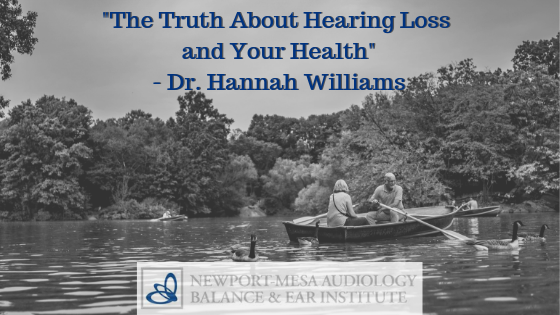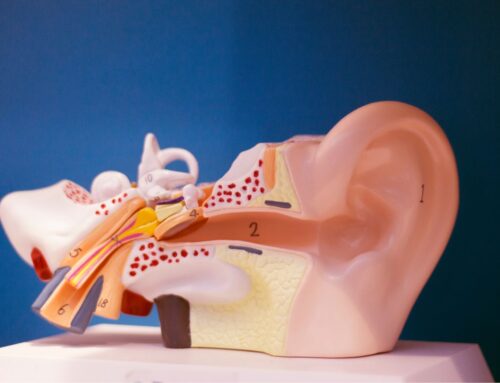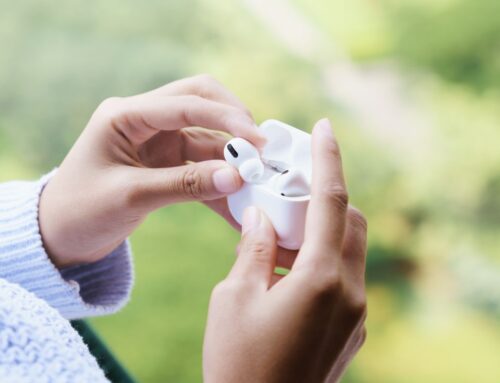
Dr. Hannah Williams
When you get treatment for hearing loss, it has the proven ability to positively affect your overall health and well-being. With the growing global elderly population, the World Health Organization (WHO) estimates by 2050, more than 900 million people will have disabling hearing loss. They also estimate that unaddressed hearing loss comes with an annual global cost of at least $750 billion. The FDA states that only one-fifth of people who could benefit from a hearing aid actually seek it out. Studies show that leaving hearing untreated causes these people with a cascade of negative health effects including an increase of 46% in overall medical expenses, as well as decline in quality of life and independence.
Unfortunately, hearing loss is a prevalent chronic condition, especially in the senior population. The 2001-2008 National Health and Nutritional Examination Surveys (NHANES) shows that the overall prevalence of hearing loss (≥25 dB HL bilateral) was 26.8% for those between ages 60-69, 55.1% for people ages 70-79, and 79.1% for people ages 80 and older. Additionally, the rates become considerably higher when unilateral hearing loss is included (44.9%, 68.1%, and 89.1%, respectively).
Navigating life with prolonged hearing loss ultimately affects your ability to communicate with others, remain mentally sharp and keep stable on your feet. It’s hard to be social when you can’t understand what people are saying to you and it’s extremely frustrating (and exhausting) to have to ask them to repeat themselves all the time. Talking on the phone with friends and family is especially difficult, because you can’t rely on lip reading or other nonverbal cues to decipher meaning from the conversation. It even makes the simple enjoyment of watching television and movies difficult, while turning up the volume to extreme levels can be bothersome to others in the home (not to mention neighbors).
People with hearing loss tend to distance themselves from social situations, which can lead to isolation. Isolation and subsequent loneliness can contribute to depression. If the individual is still employed, it can also affect their ability to succeed in their job and the compounded stress that goes along with it. Another consequence of this is decreased earning potential and premature departure from the workforce.
Research shows hearing loss can also lead to cognitive decline – confusion, motor coordination, memory loss, impaired judgement to name a few. This is possibly linked to Alzheimers and dementia, due in part to a process of auditory deprivation, a permanent, irreversible loss of understanding because the brain hasn’t received the essential sound stimulation it needs for too long. The parts of the brain responsible for comprehending the speech have deteriorated, so even when we receive the sound loud enough, the comprehension is no longer there, thus making it permanent. Hearing is a brain function and it is a ‘use it or lose it’ issue.
With hearing loss and cognitive decline, comes incoordination and difficulty completing normal daily activities. This can mean people with hearing loss are at more of a risk for falls and other injuries. A study done by Frank Lin, M.D., Ph.D at Johns Hopkins University School of Medicine and the University’s Bloomberg School of Public Health and Ferucci found that people with at least 25dB hearing loss are three times more likely to report a fall. And for every 10dB increase in hearing loss, there was a 1.4 times increase in chance of falling. This may be attributed to people who can’t hear well, might not have adequate awareness of their overall environment as the brain uses cues to maintain spatial orientation, making tripping and falling more likely. Falls are the leading cause of fatal and non-fatal injuries among the elderly, which can lead to substantial financial, health, social and emotional consequences.
The perceived high price of hearing devices can be a deterrent for many, as some insurances don’t provide adequate benefits. Despite the cost, it’s invaluable to be evaluated by a doctor of audiology and to get properly fitted. Not only that, it’s important to have your hearing devices regularly cleaned and maintained. Build up of cerumen (ear wax) can impede the hearing device’s function, leading people to think that it’s malfunctioning.
Over the counter hearing aids may seem cheap and convenient, patients who have tried them have commented that they are uncomfortable and harder to filter speech from other sounds. Also, they can’t be calibrated or programmed to each individual audiogram. Research shows that hearing aid users are more likely to be satisfied with their purchase if they receive hearing-care services, including tips on how to hear better in certain situations, gradually increasing wearing time and limiting use to the home at first. Our doctors of audiology are pivotal in providing patient-focused care and educating them on their hearing health.
If you feel, or know for a fact, that you have hearing loss, but haven’t been wearing a hearing device, we encourage you to start right away. The earlier you get your hearing loss diagnosed and treated, the sooner you can mitigate the harmful health consequences. Be proactive about your health, wellness and happiness before it begins to affect your social life, cognitive abilities, finances and overall happiness. If you are worried about the aesthetics of a hearing aid on your ear, take comfort that plenty of young people are walking around with hardware in their ears – ear buds, AirPods and other Bluetooth devices. We also offer the completely invisible Lyric hearing device to our patients. Learn more: www.dizziland.com/lyric
Don’t delay – schedule an evaluation with our Patient Services Team today. Hearing is a critical component of our five senses that you don’t have to continue living without.
References:
Hearing Loss and Cognitive Decline in Older Adults. Lin, Frank M.D. Ph.D. et al. JAMA Internal Medicine 2013. JAMA Intern Med. 2013;173(4):293-299.Published online January 21, 2013. doi:10.1001/jamainternmed.2013.1868
“Hearing Loss and Falls Among Older Adults in the United States” Frank Lin, M.D. Ph.D., Luigi Ferrucci, M.D., Ph.D. Archive of Internal Medicine 2012
Source : no. 669 Sonova B2C Segmentation 2017 Sonova B2C Segmentation study N=2506
https://vestibular.org/news/06-11-2014/danger-falling-down
https://www.who.int/news-room/fact-sheets/detail/deafness-and-hearing-loss
https://www.fda.gov/news-events/press-announcements/fda-takes-steps-improve-hearing-aid-accessibility






Leave A Comment